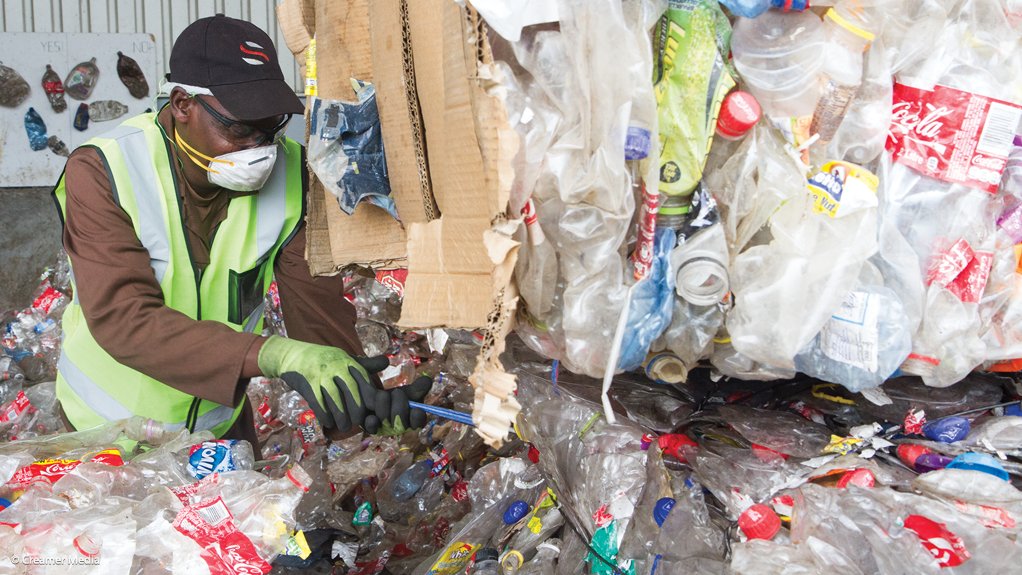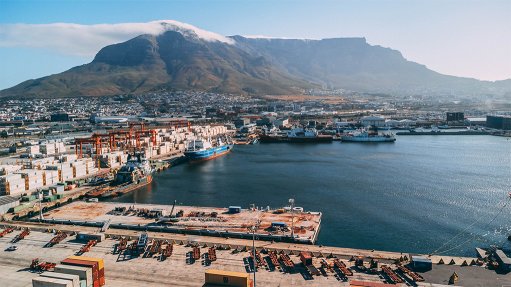Recycling problem not just confined to plastics – Sapro
The recyclability of many products in the South African market is “just not being considered anymore”, with very few product designers considering end-of-life during the design stage of the product, South African Plastics Recycling Organisation’s (Sapro's) Annabé Pretorius tells Engineering News Online.
In response to reports earlier this week that plastic supermarket carrier bags were no longer recyclable, owing to the use of “fillers” such as calcium carbonate – which lower input costs and make bags denser – Pretorius noted that the recycling problem was not just confined to the plastics sector.
She noted with the slow economic growth, companies were more focused on making a small margin and selling a product than on the end-of-life design of a product.
“We are starting to see challenges with huge paper labels that leave glue residues; paper labels that disintegrate during the recycling process and contaminate the recyclate with fibre waste and multi-layer and multi-material films for so-called environmental packaging, which is not recyclable at all.
"Carrier bags is an emotional product and draws the most attention,” Pretorius said.
“The recycling of carrier bags was never an issue. For the last decade or so, carrier bags formed part of the mixed and colour film waste stream and were recycled with other films.
“Only about 20 months ago, recyclers became aware of high losses during the recycling process. Closer investigation clearly indicated the high volumes of film waste in the waste tanks, such as the mug and mud that gets discarded to landfill. That is when recyclers started to exclude carrier bags from their incoming material streams. It has now reached levels where no recycler is taking carrier bags,” she emphasised.
Pretorius also highlighted that a different separation solution than the normal float-sink process currently being used by recycling companies could work, in theory, but that it was not financially feasible.
“Heavily filled plastic films can be granulated, washed, dried and repelletised – but what would such granules be used for? Most recycled polyethylenes are used in building films and irrigation pipes. Neither of these can accommodate large filler contents.
“How would post-consumer packaging be cleaned of residual content, pet waste, tomato sauce, sand, papers, if it cannot be separated from its contamination in a sink-float process? Perfectly clean bags can be recycled because it won’t need the cleaning process. As far as I am aware, the bulk of carrier bags have secondary and tertiary use after being used to take shopping home and is definitely not ‘perfectly clean’ when discarded.”
In countries where energy-from-waste is used, bags can be discarded to be used as energy. “In South Africa, we only have mechanical recycling. Europe is now moving more towards mechanical recycling as it makes more sense to keep plastics plastic for longer. If you need an energy source, there are cheaper options than plastics, a petrochemical resource.”
Further, she pointed out that the price tag on plastic bags was not a sufficient deterrent to keep consumers from using them. “People get used to so-called discouraging taxes and would sacrifice other products to afford what they need, or think they need. Cigarettes is a classic example,” she explained.
On the question of whether the country should introduce paper bags at its supermarkets and retail stores, as opposed to the unrecyclable plastic, Pretorius highlighted that there were not enough trees in South Africa to meet the demand, adding that the environmental footprint of this volume of paper would be “huge. It does not make sense to just move to another material.”
Pretorius further explained that a ban on single-use bags – which is already in place in many other countries – would not result in the country being litter-free or ensure that alternative bags are recyclable.
“The normal arguments would apply: job losses, potential revenue,” she stated, adding that the real problem was that waste was not necessarily ending up on landfill.
“Only 45% of the population has access to waste removal services. What is the rest doing with their solid waste? It never reaches landfill sites. Having an alternative packaging will still not end up on landfill, it may not even be recyclable and it may be too expensive for the lower-income group to use as general packaging medium.”
Comments
Announcements
What's On
Subscribe to improve your user experience...
Option 1 (equivalent of R125 a month):
Receive a weekly copy of Creamer Media's Engineering News & Mining Weekly magazine
(print copy for those in South Africa and e-magazine for those outside of South Africa)
Receive daily email newsletters
Access to full search results
Access archive of magazine back copies
Access to Projects in Progress
Access to ONE Research Report of your choice in PDF format
Option 2 (equivalent of R375 a month):
All benefits from Option 1
PLUS
Access to Creamer Media's Research Channel Africa for ALL Research Reports, in PDF format, on various industrial and mining sectors
including Electricity; Water; Energy Transition; Hydrogen; Roads, Rail and Ports; Coal; Gold; Platinum; Battery Metals; etc.
Already a subscriber?
Forgotten your password?
Receive weekly copy of Creamer Media's Engineering News & Mining Weekly magazine (print copy for those in South Africa and e-magazine for those outside of South Africa)
➕
Recieve daily email newsletters
➕
Access to full search results
➕
Access archive of magazine back copies
➕
Access to Projects in Progress
➕
Access to ONE Research Report of your choice in PDF format
RESEARCH CHANNEL AFRICA
R4500 (equivalent of R375 a month)
SUBSCRIBEAll benefits from Option 1
➕
Access to Creamer Media's Research Channel Africa for ALL Research Reports on various industrial and mining sectors, in PDF format, including on:
Electricity
➕
Water
➕
Energy Transition
➕
Hydrogen
➕
Roads, Rail and Ports
➕
Coal
➕
Gold
➕
Platinum
➕
Battery Metals
➕
etc.
Receive all benefits from Option 1 or Option 2 delivered to numerous people at your company
➕
Multiple User names and Passwords for simultaneous log-ins
➕
Intranet integration access to all in your organisation





















